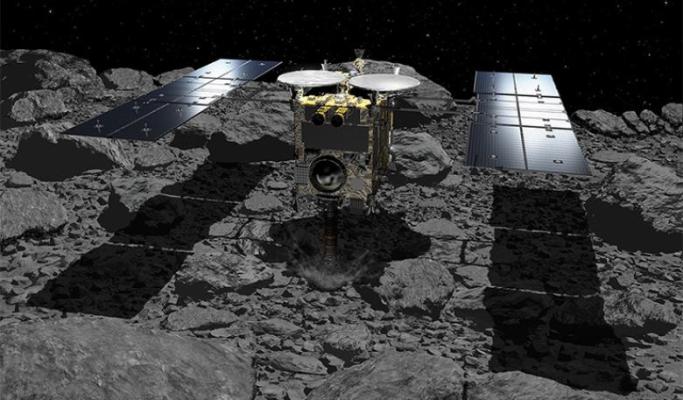To learn more about the solar system’s origin and evolution, the Japan Aerospace Exploration Agency (JAXA) is investigating typical types of asteroids. Analysing samples from asteroids enables us to study organic matter and water in the solar system.
JAXA’s asteroid explorer, Hayabusa2, is on an asteroid sample-return mission that started on 3 December 2014, from Japan’s Tanegashima Space Center. The 3.5 year voyage spanned nearly 3.2 billion kilometres (over 8,000 times the average distance from Earth to the Moon). The explorer finally reached Ryugu asteroid on 27 June 2018.
Since September 2018, Hayabusa2 has deployed 1 lander and 2 rovers to Ryugu’s surface to investigate the asteroid. Impressively, Hayabusa2 also completed 2 sample collections, on 21 February 2019 and 11 July 2019.
Hayabusa2 plans to depart Ryugu in December 2019. The return trip is expected to take a year with retrieval operations planned to occur in the South Australian desert area of Woomera.
On 13 June 2010, Hayabusa (JAXA’s first asteroid sample-return mission) successfully returned to Earth after landing on a small asteroid named Itokawa. It was retrieved from the Woomera Prohibited Area, with the Australian Government and JAXA working closely to ensure the re-entry activities were safe.
Head of the Australian Space Agency, Dr Megan Clark AC commented on the responsibility for authorising Australian space activities.
‘The successful return of Hayabusa in 2010 is a great example of achieving shared ambition with international counterparts through partnership. This activity again highlights the role Australia can play in the growing space economy. We look forward to working with JAXA, and encouraging entrepreneurship while ensuring our activities are safe, in space, and on Earth,’ said Dr Clark.
JAXA is currently in discussions with the Australian Government for the safe return of Hayabusa2, expected on 6 December 2020. The Australian Space Agency will coordinate the licensing requirements. The Department of Defence will provide support and access to the area and the Defence Science and Technology Group will conduct cooperative scientific activities with JAXA.

